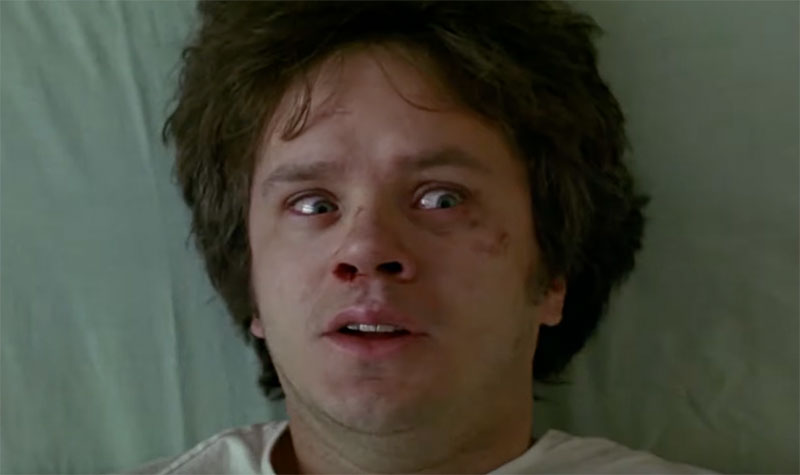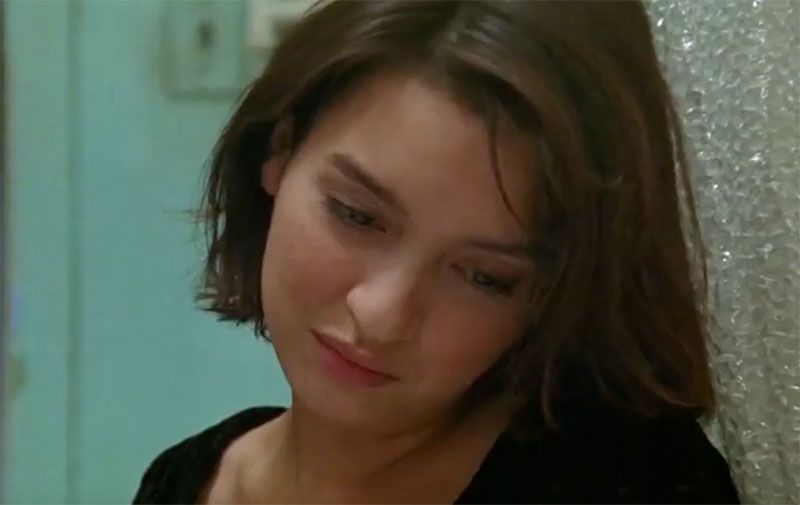
The 1990 psychological horror film Jacob’s Ladder pioneered the genre with its nightmarish imagery and ambiguous, fragmented storytelling. Many viewers walked away from the film disoriented by its surrealism and enigmatic ending. But looking closer at the themes and story reveals a cohesive, if complex, exploration of war trauma and grief. Let’s break down the symbolism in Jacob’s Ladder to make sense of its seemingly impenetrable horrors.
The Plot
The movie begins with Jacob’s unit in the Vietnam War’s Mekong Delta, where chaos ensues and the squad members exhibit strange behavior. After being stabbed with a bayonet, Jacob wakes up in a New York subway, which feels eerie and unfamiliar. He encounters bizarre occurrences, such as seeing tentacles on a homeless man. Returning home, Jacob is plagued by traumatic memories of Vietnam, which intrude into his daily life. He also discovers that his ex-wife looks after their two children, one of whom died in a car accident before the war.
As Jacob tries to make sense of his experiences, he realizes that the real world is distorting, and he becomes chased by demonic figures in a car. Seeking answers, he searches for his doctor and ex-squad mate, only to find that there are no records of their existence. Jacob’s hallucinations intensify, leading him to a party where he experiences a breakdown. Subsequently, he enters an alternate reality in which his youngest son is alive. However, he quickly finds himself back in a bathtub, gradually recovering.
Jacob’s research into demons and his contact with an old platoon mate, Paul, who also sees similar visions, point to a nefarious cause behind their experiences. They suspect a connection to the suspicious deaths of their unit members. Jacob seeks legal help but soon realizes that there are no government records of his service in Vietnam. His suspicions are confirmed when he is abducted, resulting in paralysis.
While hospitalized, Jacob encounters more hallucinations and horrors before a doctor informs him that he is already dead. Fortunately, he wakes up again in the real world and is visited by his wife. Louis, his angelic chiropractor, picks him up and miraculously cures his paralysis. During this moment, Louis delivers a crucial line, suggesting that being frightened of death and holding onto life will lead to seeing devils tearing one’s life away. However, making peace with death allows the devils to become angels, freeing the soul.
Jacob is then contacted by Michael Newman, a therapist who reveals that their platoon was unknowingly subjected to a drug test known as Ladder. This drug, which increased aggression, had unintended consequences, causing the soldiers to lose their minds and attack each other. Jacob recalls the face of the soldier who stabbed him and returns to his old family house, where his deceased son Gabe leads him upstairs into the light. It is revealed that Jacob tragically died in Vietnam in 1971.
Jezzie

In “Jacob’s Ladder,” Jezebel “Jezzie” Pipkin, portrayed by Elizabeth Peña, is a complex and crucial character whose role is layered with symbolism and ambiguity. She is Jacob Singer’s girlfriend in the “present” timeline, providing a stark contrast to his ex-wife, Sarah, in his “past” timeline.
Jezzie is initially introduced as a source of comfort and support for Jacob. She is his lover, his confidante, and seemingly his anchor in the midst of his escalating hallucinations and paranoia. However, as the narrative unfolds, Jezzie’s character takes on a more sinister role.
The name “Jezebel” itself carries biblical connotations, referencing a queen in the Old Testament known for leading her husband astray from God. In a similar vein, Jezzie can be seen as a seductive figure who distracts Jacob from his path towards acceptance and peace. She represents earthly desires and attachments that Jacob must let go of to ascend his metaphorical ladder.
In one of the film’s most pivotal scenes, Jezzie undergoes a transformation in Jacob’s eyes, morphing into a demonic figure during a party scene. This revelation suggests that Jezzie may be a part of Jacob’s personal hell, a manifestation of his guilt and fear. She symbolizes the part of Jacob that clings to life and resists the transition to death.
Towards the end of the film, Jezzie undergoes a transformation in Jacob’s eyes, morphing into a demonic figure during a party scene. This could be interpreted as Jacob finally recognizing the destructive influence she has on his journey towards acceptance and peace.
Louis

Louis, played by Danny Aiello, is a pivotal character in “Jacob’s Ladder” despite his limited screen time. He is a chiropractor who serves as a source of physical relief for Jacob Singer, the protagonist, but his role extends far beyond that. Louis is a beacon of wisdom and comfort, providing spiritual guidance to Jacob throughout his tumultuous journey.
Louis’s character can be seen as a representation of an angel or a spiritual guide. His office, a place where Jacob finds physical relief from his pain, can be interpreted as a sanctuary or a haven amidst the chaos of Jacob’s life. Louis’s healing hands not only mend Jacob’s physical ailments but also provide a sense of calm and peace, offering a stark contrast to the torment Jacob experiences elsewhere.
One of the most significant scenes involving Louis is when he quotes the 14th-century Christian mystic Meister Eckhart: “Eckhart saw Hell too; he said: ‘The only thing that burns in Hell is the part of you that won’t let go of your life; your memories, your attachments. They burn them all away. But they’re not punishing you,’ he said. ‘They’re freeing your soul.'”
This quote is central to understanding the film’s exploration of life, death, and the afterlife. It suggests that Jacob’s horrifying visions and experiences are not punishments but rather a process of purification, a burning away of his earthly attachments to prepare his soul for ascension. This interpretation aligns with the film’s conclusion, where Jacob finally lets go of his life and ascends the symbolic ladder with his son.
In essence, Louis serves as a grounding force in “Jacob’s Ladder.” He provides wisdom and perspective, helping both Jacob and the audience navigate the film’s complex themes of life, death, and the afterlife. His character is a testament to the film’s depth and philosophical underpinnings, making him a significant, albeit understated, part of “Jacob’s Ladder.”
The Hospital
The hospital scene in “Jacob’s Ladder” is one of the most intense and disturbing sequences in the film, serving as a critical turning point in the narrative. It’s a culmination of Jacob Singer’s escalating hallucinations and paranoia, and it’s where the line between reality and illusion becomes even more blurred.
In this scene, Jacob is abducted by faceless men and taken to a decrepit, nightmarish hospital. The hospital is filled with horrifying imagery: patients with grotesque injuries, doctors performing gruesome procedures, and a general atmosphere of chaos and despair. The hospital staff, who appear more like torturers than healers, subject Jacob to a spinal tap without anesthesia, heightening the sense of horror.
This scene can be interpreted in several ways. On one level, it could be seen as a manifestation of Jacob’s deep-seated fears and trauma from his time in Vietnam. The faceless men could represent his fellow soldiers, the hospital could symbolize a battlefield medical station, and the horrifying procedures could reflect the violence and brutality he witnessed during the war.
On a deeper level, the hospital scene could represent Jacob’s personal hell. According to some interpretations of the film, Jacob is in a purgatory-like state, and his experiences are a process of purification before he can ascend to heaven. The hospital scene, with its intense suffering and fear, could be part of this purification process.
The hospital scene is also significant because it’s where Jacob first learns about “The Ladder,” a drug that was allegedly tested on his unit in Vietnam. This revelation adds another layer of complexity to the narrative, suggesting that Jacob’s hallucinations could be the result of drug-induced psychosis.
The Ending

The ending of “Jacob’s Ladder” is one of the most debated aspects of the film. In the final scenes, it is revealed that Jacob had been mortally wounded in Vietnam and that the events of the film were hallucinations experienced in his dying moments. This revelation reframes the entire narrative, suggesting that Jacob’s experiences were a form of purgatory or a limbo state between life and death.
The film concludes with Jacob being led up a staircase (a symbolic “ladder”) by his deceased son, Gabe. This scene can be interpreted as Jacob finally accepting his death and ascending to heaven, thus finding peace.
Though not a conventional narrative, Jacob’s Ladder conveys visceral emotional truth through its nightmarish visuals and disjointed structure. By experiencing the horrors through Jacob’s eyes, we connect to the grim agony of his condition in a uniquely visceral way.

Theodore Lee is the editor of Caveman Circus. He strives for self-improvement in all areas of his life, except his candy consumption, where he remains a champion gummy worm enthusiast. When not writing about mindfulness or living in integrity, you can find him hiding giant bags of sour patch kids under the bed.
